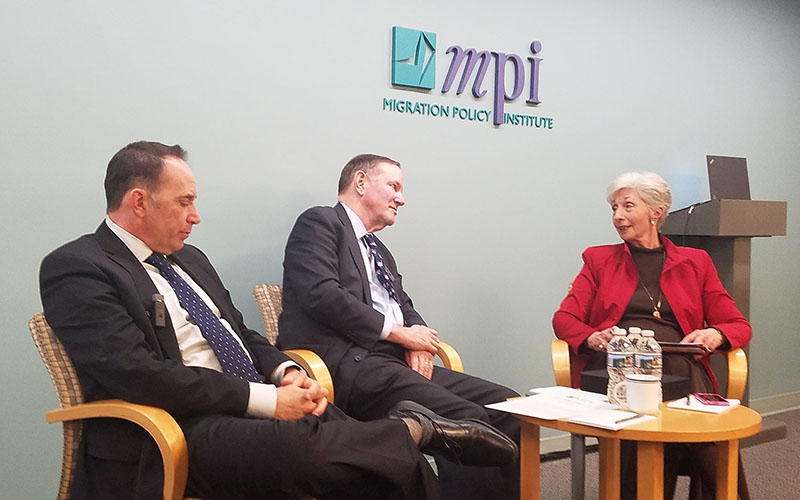
Former Arizona Gov. Janet Napolitano spoke by videoconference at the session on the future of DACA with, from left, Ike Brannon, Don Graham and the Migration Policy Institute’s Doris Meissner. (Photo by Dustin Quiroz/Cronkite News)
WASHINGTON – Former Homeland Security Secretary Janet Napolitano told a Washington panel Friday that she will use her current position as president of the University of California to protect DREAMers, whether the Deferred Action for Childhood Arrivals program is still in place or not.
President Donald Trump promised during a campaign stop in Phoenix in August that he would do away with DACA, a policy enacted under former President Barack Obama that deferred deportation for certain immigrants who were brought to this country illegally when they were still children.
Trump had vowed to immediately overturn DACA, which Republicans have long criticized as an unconstitutional overreach by the president, but he has yet to do so despite a spate of executive orders during his first week in office, including two aimed at cracking down on immigration.
Napolitano, the former governor of Arizona who started DACA under her watch at Homeland Security, said doing away with the program would be the wrong thing to do, leading to financial, economic and ethical setbacks for the U.S.
“They are precisely the kind of talent that we want to have remain in the country,” Napolitano said of the roughly 700,000 immigrants protected by DACA. “They’re productive young people that’ve done all that we’ve asked.”
She was speaking by teleconference to a panel at the Migration Policy Institute here on the future of DACA.
Her support of immigrant students was seconded by Don Graham, who said DREAMers have posted a 94 percent college retention rate since 2014. Graham, the former publisher of the Washington Post, is co-founder of TheDream.US, which works to get immigrant children into college.
“They’re an extraordinary group, you have to want them in this country,” Graham said.
Trump has said that illegal immigrants cost the country billions of dollars every year, but another panel member said Friday that he had done a few studies showing that “immigrants really aren’t that costly.”
Ike Brannon, a visiting fellow at the Cato Institute who specializes in fiscal policy, said the real cost to the country would be in removing them all.
“If we were simply to remove DACA and make them all illegal, then also depart them, the total economic cost would be $2 billion in the 10-year budget window,” Brannon said.
But there are non-economic reasons for doing away with DACA, said one critic of the program. Ira Mehlman of the Federation for American Immigration Reform said Obama’s enactment of the policy set a “dangerous precedent” of presidential overreach.
“It was an unconstitutional act by President Obama,” said Mehlman, who scoffed that Napolitano did not enforce immigration law as secretary of Homeland Security so he would not expect her to do so now.
But Napolitano, who oversees the 10-campus University of California system, said DACA recipients came to this country through “no fault of their own” and the concept of prosecutorial discretion behind the program – giving authorities leeway in deciding to who prosecute and deport – is sound.
Under her leadership, the University of California issued a statement shortly after Trump’s election committing the university system to resisting any attempt to vet its students and refusing to “voluntarily” turn any student records over to local or federal immigration officers.
“It really is a movement amongst higher ed, recognizing the value of these students,” she said of the pushback against efforts to overturn DACA. “We want their talents, we want their brains, and we want their contributions to this country.”